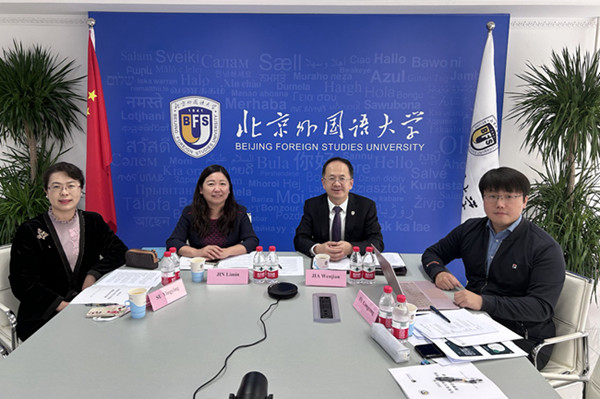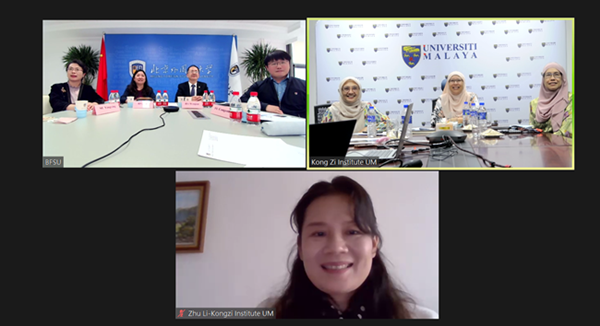The 10th Council Meeting of the Confucius Institute at the University of Malaya (UM) was held online on Oct 13.
Those in attendance of the meeting included representatives from the UM, Beijing Foreign Studies University (BFSU) and the UM Confucius Institute.

The 10th Council Meeting of the Confucius Institute at the UM is held online on Oct 13. [Photo/bfsu.edu.cn]
Jia Wenjian, deputy Party secretary of the CPC BFSU committee and vice-president of the university, affirmed the achievements made by the Confucius Institute in Chinese language teaching, cultural activities, local teacher training and its "Chinese plus" project over the past year, and expressed his gratitude for the support given by leaders of the UM, as well as for the sincere cooperation of fellow workers from both sides.
Jia said that he hopes the two universities will take the Confucius Institute as a link to carry out all-round cooperation in discipline construction, talent training, scientific research and resource sharing in order to further promote educational exchanges between China and Malaysia.
Yatimah Alias, deputy vice-chancellor of the UM, praised the work of the Confucius Institute and thanked BFSU for the strong support it offered.

Zhu Li, Chinese director of the UM Confucius Institute, speaks at the 10th Council Meeting of the Confucius Institute. [Photo/bfsu.edu.cn]
The council appointed Alias as a council member of the institute. Participants in the meeting reviewed issues discussed by the previous council, and deliberated the work, activities and financial reports of the Confucius Institute for the past year and discussed its development planning.
They also discussed the local teacher training center program in Malaysia, the progress of BFSU’s overseas internship base, and the establishment of a teaching site at the Chinese Cultural Centre in Kuala Lumpur.
The UM Confucius Institute was established on July 8, 2009. Jointly built by BFSU and the UM, it has been in operation since March 2010, and won the title of Advanced Confucius Institute at the 2019 International Chinese Language Education Conference.
The institute is mainly open to ethnic Malays and other non-Chinese ethnic groups, while taking into account the learning demands of the ethnic Chinese. Based on BFSU’s advantages in Malay language education, it values the establishment and development of a two-way language and culture exchange mechanism between China and Malaysia, and aims to build a platform for cooperation between the two countries.

